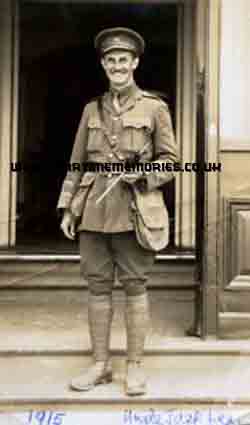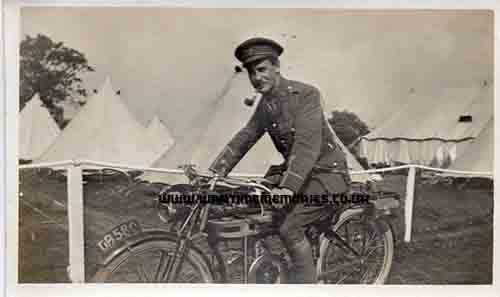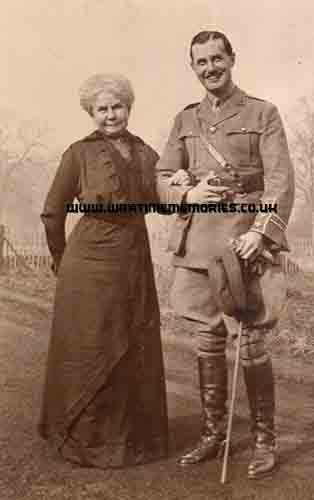Additions will be checked before being published on the website and where possible will be forwarded to the person who submitted the original entries. Your contact details will not be forwarded, but they can send a reply via this messaging system.
please scroll down to send a message
Capt. Jack Lee MC.
British Army 6th Btn. Cheshire Regiment
from:Woodside, Wilmslow, Cheshire
(d.31st July 1917)
My grandfather, Jack Lee, was the eightth child of William Lee, who from poor beginnings had founded a successful Manchester Clothing Company, Kay & Lee Ltd., and his wife Isabella.
At the outbreak of war Jack had joined the Manchester Regiment with his older brother Bert (who was killed at Gallipoli on Christmas Day 1915), but he then trained to be an officer and was commissioned into the Cheshire Regiment in January 1915. He was posted to Aberystwyth for training where that summer he met and fell in love with a university student, Nancy Erskine. Shortly after they met, her brother Tommy was killed in action on the Western front at Hooge in Belgium. In an act of incredible courage, he had tried to break into a German pill-box with an axe. He had previously been awarded the Military Cross for bravery, and his family believe that his final act was recommended (without success) for a Victoria Cross.
At Christmas Jack bought Nancy an engagement ring. They were married the following year, and on 15th February 1917 she gave birth to William Jack Barrie Lee, my father. Jack was able to take leave for the week of the birth before leaving Carlisle when the baby was two days old. He spent a couple of days at the family home in Wilmslow before travelling south to rejoin his regiment. However, his sailing was cancelled due to enemy submarines in the channel and he was able to make the lengthy journey back to Carlisle for another brief visit, finally sailing for France on 24th February 1917.
Jack Lee never saw his son again. Five months later the Cheshire Regiment took part in the Third Ypres offensive which began on 31st July with an action known as the Battle of Pilckem Ridge. In a letter written to Isabella Lee after he was released from captivity at the end of the war, Corporal F Burch of the 1st Battalion Hertfordshire Regiment described the events of that morning:
Streatham SW
17/1/19
Dear Mrs Lee,
I hope you will not think badly of me for not answering your lovely letters before, but really my time seems so full that I have had to neglect my correspondence. Miss Rendell certainly did wonder why you had not answered her letter, but was sure you had a good reason for it. We are both deeply sorry that it was the death of your sister-in-law, and pray that God in all his goodness has given you strength to bear this additional sorrow. (A reference to Aunt Bessie who had passed away in December 1918.) I am so pleased that you liked the photo group so much, the dear old Dad has gone nearly white-haired since it was taken but Miss Rendell and myself have not altered in the least.
Now to the best of my ability I will tell you about that fateful July 31st. Some of the things that happened I have forgotten, but the majority are of course impressed on my memory. You know of course that the 6th Cheshires and 1st Herts were brigaded together, so that by reading what my regiment did you will know what Captain Lee's did.
Our Brigade had to go over last of all in the Division as our objective, called the Langemark Line, so that we had to pass through the first two Brigades on our way. At about 4.15 am we received our order to go over the top, and away we went. The sight which met our eyes I shall never forget, but it was also one which I cannot describe. All went well with us until we reached the half-way line, where we had to rest two hours just behind a ridge, after which we had a rather warm time, but with only two casualties. We had to take Kitcheners Wood which the Germans were shelling heavily but we got through all right. A little further on we came to the River Steenbech which we crossed with only two more casualties although we were swept with heavy machine gun fire from the right flank. From that point we had to advance in open order, the Black Watch on the left, Herts in the centre, Cheshires on the right, and as I was in charge of the extreme right section in our regiment, I was in touch with the Cheshires all the way afterwards. Our next job was to capture the village of St Julien, the Herts and the Cheshires taking a half each, and it is needless to say that we got it. But now our real task was in front of us, the taking of the Langemark Line, and we saw that it was a stiff task for we had to advance over 500 yards of completely flat open country and the trench was in the form of a semi-circle, simply packed with Germans. We were immediately subjected to severe machine gun and rifle fire, and to make matters worse our own barrage was falling all amongst us and not touching the Germans. But even then all might have been well if one single British aeroplane had been above us to see what was happening. We all looked in vain though and kept on pegging away.
Hundreds had fallen or were falling, but we managed to get within 50 yards with every officer shot and almost every NCO. It was just before that that I saw your son lying in a shell hole, a shallow one, but strict orders had been issued that we were not to stay and assist wounded men as it would hinder our advance, so I had to go on. When we found we hadn't enough men to continue, we thought that the best thing to do was to get into shell holes and wait for the supports to come up, but on looking behind us to see where they were we could see only Germans - they had got in behind us and cut us off. Just at that point the order every man for himself was passed down the line so we started trying to get back, at first in a group but men were falling so fast that it soon became ones and twos. At one place there were three of us in a small shell hole and we decided to try for one farther back. The other two were killed and I reached the hole alone, almost falling on top of your son who said hello corporal straight away.
I set to work to see what was wrong with him and found he had been hit in the small of the back in the region of the right kidney. The wound had stopped bleeding but I could see he was badly hit internally and by the shape of the wound it was shrapnel. He told me he felt no pain whatsoever but on looking into his face I saw he was too far gone to feel anything so I cut his equipment off and removed a khaki covered steel plate which the shrapnel had penetrated, and then made a pillow for his head out of his respirator so that he could lie as comfortable as possible. Then I saw that he had begun to write a letter to his mother, it was on the back of a torn photograph of German trenches taken by one of our aeroplane observers. He finished the letter but the latter half was unintelligible and I only glanced at it as I put it in my pocket. I cannot remember any actual sentences but I know it was to the effect that he was thinking you at the time, that he had done his bit and you were to have the M.C. he had won at Ypres a month before. About his wife and child I saw nothing. I did not know he was married until I received your letter in Germany, but he may well have put a message for them in the part I could not read through. If I had had the time I might have been able to decipher it. He told me to take the little gold ring off his little finger (I remember it was so tiny I would not go on me, so I put it in my purse and if I remember rightly it had the date 1915 on the inside). Next he asked me for a drink and when he had had that he told me to take his revolver, field glasses and an electric torch, and also a couple of correspondence books which were in his pack, and send them all with the ring and his letter to you. He then asked me if we had taken the final objective as it seemed to be so much quieter, which it was - I told him we were waiting for reinforcements to come up first. More than once he asked me for a drink, and repeatedly said he felt no pain. I don't think he did but he was so brave I could have cried over him. While I was with him the Germans singled us out, and one big shell burst within a foot of my head, but by a miracle we both escaped. Bullets flew all round us but we were unhurt by them, and my belief to his day is that your son was hit by one of our own shells. So many were the Germans couldn,t hit us.
After I had been about a quarter of an hour with him I looked down to see that he had gone and so peacefully that I had not noticed it. After that I tried the almost impossible task of getting back and, getting into one hole after another, I at last found a comrade in the shape of a lance corporal of the Cheshires. We stayed together shooting Germans all around us until four of them got quite close without our noticing them. We immediately jumped out after them to make a fight for it and actually reached them before we saw there were scores of Germans lying in shell holes all around us. The Cheshire with me took the rifle out of my hands almost before I knew it and I remember I laughed and he and I shook hands. The Germans (they were Saxons) were jolly decent and only took your son's revolver from me, but everything else I had to leave behind except the ring and letter in my pocket. I saw a few more men captured round about but you will be pleased to know that none of us put our hands up.
We were escorted through no man's land and along a trench to some headquarters. Here an officer who spoke excellent English was joking with us so, being afraid everything would be taken off me, I asked his advice with regard to the letter and the ring. He was full of sympathy and said he would see that you got them within three weeks if I left them with him. I could see that he was speaking the truth so I gave them to him, writing a letter to you myself to go with them. Your address I memorised and I was not likely to forget it. We had to be moved quickly after that as our gunners began knocking the whole place to pieces with high explosives and my belief is that he must have been killed because I know he meant to keep his word, that is probably the reason why the ring and letter did not reach you.
These are all the facts I can at present think of Mrs Lee of what happened on 31st July 1917, and I tender you my deepest sympathy on losing such a brave tender son and to Mrs Jack Lee on losing a husband who was loved so much by his men. All that I have written is true, not just to show you what I did, but to tell you everything that happened as it happened, for your son's men went through I as well as myself. A man of the 6th Cheshire whose name I have forgotten but who lives near you was captured on the same day as myself, and he told me all about Captain Lee, saying how he was well loved by his men and considered the best officer in the battalion.
Any questions you like to ask I shall be only too pleased to answer to the best of my ability, and please do not think you are causing me any trouble. I am sorry I cannot give you a definite date just now for my visit to Wilmslow as I am awaiting orders for my discharge but be assured I shall manage to see you during February. With sincere regards from Miss Rendell and myself,
I remain, Yours sincerely,
F.G.Burch 1st Herts Regiment
PS I may mention that only one sergeant, 2 corporals and 56 men out of my regiment and only one corporal and myself with the men were captured. Everyone else (including officers) were killed.


